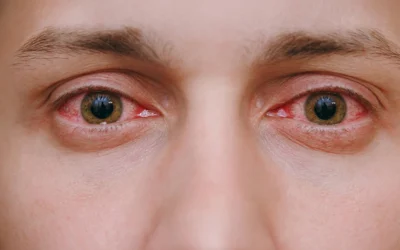Most of us rub our eyes many times throughout the day without really thinking about it. Whether we’re tired, our eyes feel dry or itchy, or there’s something stuck in one of them, it seems like the easiest way to make it feel better is to rub them a little. Unfortunately, doing that is a great way to spread germs from our fingers to our eyes.
In this blog, we’ll explore how germs can affect your eyes and when it’s a good time to schedule an eye exam in Tinley Park.
The germs on our skin and hands
Many types of microorganisms live on our skin all the time, including on our faces and hands. This microscopic ecosystem is known as “skin flora,” and it can contain around a thousand species of bacteria, as well as viruses and other germs. Some are beneficial, while others could lead to disease or infection, especially if they get into our eyes.
The eye’s natural defenses
Eyes are more vulnerable than skin to disease and infection-causing germs, but they aren’t defenseless. The eyelashes help keep irritants out, and blinking adds another layer of protection.
The tear film, a three-layer drainage system, also protects the cornea from germs and debris that reach the eye’s surface. However, rubbing your eyes can accidentally cause tiny scratches on the cornea, giving germs an opening to get inside and cause an infection.
Protecting our eyes from germs
Sometimes, touching our eyes is unavoidable. People who wear contact lenses have to touch their eyes every time they insert and remove them. Overall, it’s best to minimize touching your eyes. However, if you do, always wash your hands thoroughly with soap first.
Keeping fingernails trimmed is also important, as germs and debris collect under nails from everything we touch during the day. Long nails are difficult to clean properly, which increases the risk of transferring germs to your eyes. In fact, germs collecting under fingernails is the main reason medical professionals wear gloves when interacting with patients! This goes for fake nails just as much as natural ones.
Signs of an eye infection
It’s important to recognize the warning signs of an eye infection so you can get timely care. Common symptoms of eye infections include:
-
Redness in the white part of the eye or inner eyelid
-
Itchiness or a persistent irritation
-
Tenderness or discomfort when touching the eyelid or eye area
-
Burning or stinging sensations
-
Watery or discharge-filled eyes
-
Swelling around the eyes or eyelids
-
Sensitivity to light or blurred vision
If you notice any of these symptoms, it’s best to schedule an eye exam promptly. Early treatment can prevent the infection from worsening and help protect your vision. In the meantime, try to avoid rubbing your eyes and follow good hygiene practices to reduce the spread of germs.
Worried about an eye infection? Let us know!
If you’re experiencing any symptoms like redness, itchiness, tenderness, burning, or watery eyes, don’t hesitate to schedule an eye exam. Please give us a call at Walter Eye Clinic, so we can discuss the next steps to ensure that your eyes are healthy. And try to touch your eyes as little as possible in the meantime. Let’s all remember not to rub our eyes!



